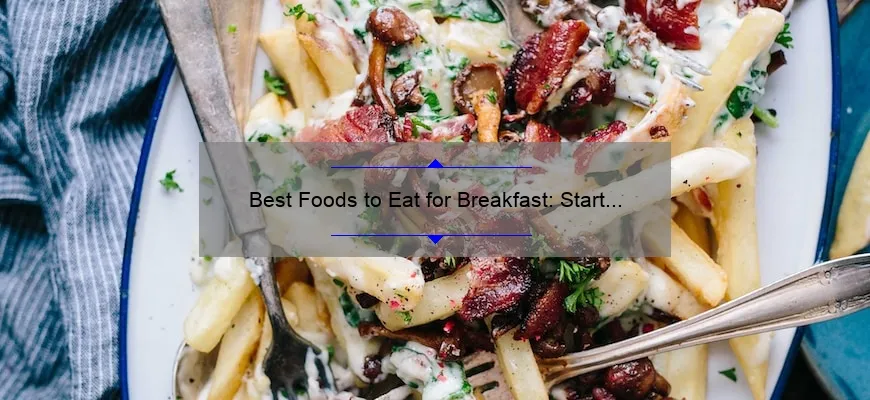Short answer best foods to eat for breakfast:
The best foods to eat for breakfast are those that provide a balance of nutrients and sustained energy. Examples include whole grains, fruits, lean protein, and dairy products. Some popular options include oatmeal, yogurt with berries, eggs, and whole grain toast with avocado.
The Ultimate Guide: Best Foods to Eat for Breakfast
The Ultimate Guide: Best Foods to Eat for Breakfast
Breakfast is often hailed as the most important meal of the day, and rightly so! It kickstarts your metabolism and provides you with the energy you need to power through your morning. But choosing the right foods for breakfast can be a daunting task, given the multitude of options out there. Fear not! In this ultimate guide, we’ll take you on a delightful culinary journey to explore the best foods that will satisfy your taste buds while nourishing your body.
1. Energizing Eggs:
Let’s begin with a classic: eggs! Not only are they versatile, but they also offer an impressive array of nutrients. Packed with high-quality proteins and essential vitamins like B12 and D, eggs provide sustainable energy that will keep you fueled until lunchtime. And who can resist a perfectly cooked omelet or a fluffy scramble? Add some veggies or cheese for an extra burst of flavor!
2. Marvelous Oatmeal:
Not just reserved for chilly winter mornings, oatmeal is a breakfast superstar all year round. Rich in dietary fiber, oats help regulate blood sugar levels and keep hunger at bay throughout the day. Customize it by adding nutritious toppings such as berries and nuts for added antioxidants and healthy fats. A warm bowl of oatmeal is like a cozy hug for your stomach!
3. Avocado Toast Extravaganza:
Avocado toast has taken the world by storm, and rightfully so! This trendy breakfast option combines creamy avocado with whole grain toast to create a harmonious blend of flavors and textures. Avocados are bursting with heart-healthy monounsaturated fats that promote satiety while providing essential nutrients like potassium and folate. For an extra touch of zest, sprinkle some chili flakes or drizzle balsamic glaze on top!
4.Smoothie Sensation:
When time is short but you still want a nutritious breakfast on-the-go, smoothies come to the rescue! Packed with fruits, vegetables, and protein sources like Greek yogurt or plant-based proteins, these colorful concoctions are not only refreshing but also full of vitamins and antioxidants. Get creative by experimenting with different combinations to find your perfect blend.
5. Whole Grain Wonders:
Ditch the refined carbohydrates and opt for whole grain options like whole wheat bread or cereal. These fiber-rich alternatives provide a steady release of energy, keeping you feeling satisfied for longer periods. Spread some natural peanut butter or almond butter on your toast for that satisfying crunch and extra boost of protein!
6. Powerful Protein Pancakes:
Pancakes needn’t be off-limits when it comes to a healthy breakfast! Opt for protein pancakes made with wholesome ingredients such as oat flour and Greek yogurt. Packed with muscle-building proteins and complex carbohydrates, these fluffy treats will keep you fueled up without any guilt! Top them off with fresh fruits or a dollop of Greek yogurt.
7. Breakfast Burrito Bonanza:
For those who crave a savory start to their day, breakfast burritos are an excellent option. Fill them up with scrambled eggs, lean meats like chicken or turkey sausage, sautéed veggies, and a sprinkle of cheese wrapped in a whole grain tortilla. This delightful fusion will satisfy your hunger while providing a balance of macros to kickstart your metabolism.
Remember, breakfast is an opportunity to nourish yourself both physically and mentally. By choosing foods that are nutritionally dense and satisfying to the taste buds, you’ll set yourself up for success throughout the day. So go ahead and embark on this ultimate guide to find your favorite breakfast delights that will leave you feeling energized, focused, and ready to conquer whatever lies ahead! Happy breakfasting!
How to Choose the Best Foods to Eat for Breakfast
Breakfast is often dubbed as the most important meal of the day, and it’s no secret that what you decide to eat in the morning sets the tone for the rest of your day. However, with a plethora of options available, choosing the best foods to eat for breakfast can be quite overwhelming. Fear not though, because we’ve got you covered! In this blog post, we’ll provide you with some professional, witty, and clever tips on how to choose the best foods to kick-start your day.
1. Assess Your Nutritional Needs:
Before diving into a bowl of cereal or grabbing a bagel on-the-go, take a moment to assess your nutritional needs. Your breakfast should ideally be a combination of carbohydrates, protein, healthy fats, and fiber to fuel your body efficiently throughout the morning. So think beyond just carbs and make sure you’re getting a balanced mix of nutrients from various food groups.
2. Opt for Whole Grains:
When it comes to carbohydrates, opt for whole grains rather than refined ones. Whole grain options like oats, quinoa, or whole wheat bread provide sustained energy release and are packed with essential vitamins and minerals compared to their refined counterparts. They keep you feeling fuller for longer while avoiding blood sugar spikes that can lead to mid-morning crashes.
3. Protein-Power Up:
Including protein in your breakfast is crucial as it helps sustain energy levels throughout the day. Eggs are an excellent source of high-quality protein and are incredibly versatile – enjoy them scrambled, poached or boiled! Greek yogurt is another great option rich in protein while also providing gut-healthy probiotics.
4. Don’t Forget Healthy Fats:
Healthy fats play a vital role in helping our bodies absorb fat-soluble vitamins and regulating hormones. Avocados are an excellent addition to any breakfast due to their high content of heart-healthy monounsaturated fats. Spread some avocado on whole grain toast or blend it into a smoothie for a creamy and satisfying morning treat.
5. Load Up on Fiber:
Fiber is key for maintaining a healthy digestive system and keeping you full until your next meal. Incorporate fiber-rich foods like berries, chia seeds, flaxseeds, or whole grains into your breakfast routine. Not only do they add texture and flavor, but they also promote satiety – ensuring you won’t be reaching for unhealthy snacks before lunchtime rolls around.
6. Stay Hydrated:
Don’t forget to hydrate yourself first thing in the morning! Alongside your breakfast choices, make sure to include a glass of water or perhaps some herbal tea with your meal. Staying hydrated kick-starts your metabolism and helps flush out toxins accumulated overnight.
In conclusion, choosing the best foods to eat for breakfast sets the stage for a productive and energized day ahead. By assessing your nutritional needs, opting for whole grains, incorporating protein sources, including healthy fats and fiber-rich foods while staying hydrated, you can create delicious and balanced breakfast meals that will leave you feeling satisfied until lunchtime strikes. So go on now, put these tips into action and experience the difference a wholesome breakfast can make in fueling both your body and mind!
Step-by-Step: Incorporating the Best Foods into Your Breakfast Routine
Are you tired of reaching for the same old cereal box every morning? Do you find yourself feeling sluggish and unmotivated by mid-morning? It may be time to shake up your breakfast routine and incorporate some of the best foods to kickstart your day. In this step-by-step guide, we will take you through an expert-approved process to transform your mornings into a delicious and energizing experience.
Step 1: Plan Ahead and Get Creative
The first key to incorporating the best foods into your breakfast routine is to plan ahead. Take a few minutes during the weekend to brainstorm different ideas and decide what you feel like having throughout the week. This way, you’ll have all the ingredients ready, saving precious time on busy mornings. Need some inspiration? Let’s delve into some fabulous options.
Step 2: The Power of Protein
Protein is an indispensable element when it comes to starting your day on the right foot. It helps keep you full, maintains muscle mass, and promotes brain function. Incorporate protein-rich foods such as eggs, Greek yogurt, or even tofu scrambles for a satisfying breakfast that will keep hunger at bay until lunchtime.
Step 3: Embrace Whole Grains
Swap out refined grains for their whole-grain counterparts to boost your fiber intake and provide sustained energy throughout the morning. Opt for whole wheat toast or bagels with nut butter or avocado toppings – perfect fuel for a productive day ahead.
Step 4: Vibrant Fruits and Vegetables
Who says fruits and vegetables are only reserved for later in the day? Introducing colorful produce into your morning routine can add vital nutrients while enhancing flavors. Whip up a refreshing smoothie with berries, bananas, spinach, or kale, or simply slice up some fresh fruit to accompany your protein-packed dish.
Step 5: Don’t Forget Healthy Fats
Incorporating healthy fats like nuts, seeds, avocados, and olive oil into your breakfast routine offers numerous benefits. These fats are not only delicious but also help provide a feeling of satiety and give your brain a much-needed boost. Try sprinkling some chia seeds on your yogurt or avocado slices on your toast for an extra nutritional punch!
Step 6: Spice It Up
Adding spices to your breakfast not only enhances the taste but also brings an array of health benefits. Cinnamon, for instance, helps regulate blood sugar levels, while turmeric is renowned for its anti-inflammatory properties. Sprinkle some cinnamon over oatmeal or add a pinch of turmeric to your scrambled eggs for an exotic twist.
Step 7: Hydration is Key
While it’s tempting to reach for that cup of coffee first thing in the morning, don’t forget to hydrate yourself properly. Water plays a vital role in kickstarting your metabolism and improving overall cognitive function. Squeeze some fresh lemon juice into warm water or enjoy a refreshing herbal tea alongside your nutritious meal.
Step 8: Get Creative with Recipe Swaps
Don’t be afraid to experiment with recipe variations to keep things interesting. Use these guidelines as a foundation but feel free to customize them as per your preferences and dietary restrictions. For example, if you’re lactose-intolerant, swap out the Greek yogurt for dairy-free alternatives like coconut or almond milk-based yogurts.
By following these step-by-step tips, you can easily incorporate the best foods into your breakfast routine, nourishing both your body and mind from morning till night. Say goodbye to boring mornings and hello to sustainable energy levels throughout the day!
Frequently Asked Questions about the Best Foods to Eat for Breakfast
Frequently Asked Questions about the Best Foods to Eat for Breakfast
Breakfast is often hailed as the most important meal of the day, and for good reason. It kickstarts your metabolism, provides essential nutrients and energy to fuel your day ahead. But with so many options out there, it’s easy to get overwhelmed and confused about what truly constitutes a healthy breakfast. In this blog post, we aim to answer some frequently asked questions regarding the best foods to eat for breakfast.
1. What makes a breakfast food “healthy”?
A healthy breakfast should ideally consist of a balanced combination of proteins, carbohydrates, healthy fats, and essential vitamins and minerals. It should also provide sustained energy throughout the morning without causing a sudden spike or drop in blood sugar levels. Opting for whole and minimally processed foods is key to ensuring you’re getting maximum nutrition from your meal.
2. Are carbohydrates bad for breakfast?
Carbohydrates are not inherently bad; in fact, they are an essential component of a well-balanced diet. The key is choosing complex carbohydrates over refined ones. Complex carbs like whole grains (oats, quinoa), fruits, and vegetables provide fiber and valuable nutrients that keep you feeling fuller for longer.
3. Is skipping breakfast harmful?
Skipping breakfast can have negative effects on your overall well-being. Eating within a couple hours of waking up helps jumpstart your metabolism, regulates blood sugar levels, improves concentration, and boosts cognitive function throughout the day. If time is an issue in the mornings, opt for quick yet nutritious options like overnight oats or grab-and-go fruit paired with almonds.
4. Can I have coffee as my sole breakfast?
While coffee may give you that initial caffeine kick and temporarily suppresses appetite, it should not be treated as a substitute for a proper meal. Coffee alone lacks vital nutrients needed to fuel our bodies efficiently throughout the day. If you can’t stomach solid food early in the morning try pairing your coffee with a small but nutrient-dense snack, like a handful of nuts or a piece of fruit.
5. Are eggs the ultimate breakfast food?
Eggs are indeed an excellent choice for breakfast as they are packed with high-quality protein, essential vitamins, and minerals. However, it’s important to vary your morning routine to ensure you’re getting a wide range of nutrients. Incorporating other sources of lean proteins like yogurt, cottage cheese or plant-based options such as tofu into your breakfast regimen can offer diversity while maintaining nutrition.
6. What about cereal? Is it a healthy option?
Not all cereals are created equal. Many commercial brands tend to be loaded with added sugars and lack nutritional value. The key is to look for cereals that contain whole grains, minimal added sugars, and high fiber content. Alternatively, consider making your own granola using rolled oats, nuts, seeds, and dried fruits – this way you have full control over the ingredients used.
7. Can I eat dessert-inspired breakfasts guilt-free?
Indulging in a dessert-inspired breakfast every once in a while can be fun and satisfying; however, it shouldn’t become a regular occurrence if you aim to maintain optimal health. Rather than relying on processed treats or sugary spreads on toast every day, explore healthier alternatives such as chia seed pudding topped with fresh berries or homemade banana bread made from whole wheat flour.
In conclusion
Choosing the best foods for breakfast requires some thoughtfulness and consideration towards balance and nutrition. Aim for variety by incorporating different food groups into your morning routine while focusing on whole foods that provide sustained energy throughout the day. Remember that consistency is key when it comes to establishing healthy habits – so start off your day right with a nourishing breakfast!
Maximizing Nutrition: Exploring the Benefits of the Best Breakfast Foods
In today’s fast-paced world, breakfast often takes a back seat when it comes to our priorities. Rushing off to work or school, we might find ourselves grabbing a sugary cereal bar or skipping the morning meal altogether. However, neglecting breakfast can have serious consequences for our health and well-being. That’s why it’s crucial to explore the benefits of the best breakfast foods and learn how they can maximize our nutrition.
The term “breakfast” itself implies breaking the overnight fast and fueling our bodies for the day ahead. When we skip this vital meal, we deprive ourselves of essential nutrients that can help kickstart our metabolism and keep us energized throughout the day. By selecting the right breakfast foods, we have an opportunity to jump-start our engine in the most nutritious way possible.
First and foremost, let’s discuss protein-rich options as one of the key components of a healthy breakfast. Protein is crucial for repairing tissues, building muscle mass, and maintaining that coveted feeling of fullness between meals. Eggs are undoubtedly one of nature’s treasures when it comes to protein-packed breakfast choices. Not only do they contain all nine essential amino acids, but they also provide valuable vitamins and minerals like vitamin B12, selenium, and choline – all important for brain function and overall well-being.
If eggs aren’t your cup of tea (or plate of scrambled goodness), fear not! Greek yogurt also deserves a spot on your breakfast table with its impressive nutrient profile. Loaded with calcium, probiotics for gut health, and boasting more protein than regular yogurt varieties, Greek yogurt is an excellent choice for those looking to maximize their nutrition in the morning.
To get an extra dose of heart-healthy omega-3 fatty acids in your diet early on in the day, reach for some nuts or nut butter spreads like almond or cashew butter as part of your balanced breakfast. These unsaturated fats promote brain health while providing you with a steady energy release. Paired with whole-grain toast or oatmeal, you’ll have a perfectly balanced breakfast that will keep you sharp and focused throughout the day.
But what about those who prefer something sweeter to kick off their morning? Berries are nature’s gift when it comes to adding natural sweetness and an abundance of vitamins to your breakfast routine. Packed with antioxidants, fiber, and various vitamins, incorporating berries into your meal plan is like giving your body a little vitamin C boost while simultaneously satisfying your taste buds.
Of course, we cannot forget the ultimate fuel for our bodies – carbohydrates. Whole grains are a perfect way to kickstart your metabolism and provide steady energy levels throughout the day. Opt for whole-grain bread, oats, or quinoa for an extra dose of fiber and important nutrients like magnesium and iron.
As exciting as these breakfast options may sound, it’s important to remember that balance is key. Portion control plays a vital role in maximizing nutrition even when it comes to the best breakfast foods. It’s all about building a plate that combines different food groups in appropriate portions so that you’re benefiting from the full spectrum of nutrients.
In conclusion, by exploring the benefits of the best breakfast foods, we can truly maximize our nutrition and set ourselves up for success throughout the day. Whether it’s protein-rich eggs or Greek yogurt, heart-healthy nuts or sweet yet nutritious berries, or energizing whole grains – there is no shortage of options to choose from. So let’s make a conscious effort to prioritize this essential meal and nourish our bodies with the fuel they deserve each morning!
Delicious and Nutritious: Recipes featuring the Best Foods for a Healthy Breakfast
Are you tired of starting your day with a lackluster breakfast that leaves you feeling sluggish and unsatisfied? Look no further! In this blog post, we’re here to elevate your morning routine by introducing you to delicious and nutritious recipes featuring the best foods for a healthy breakfast. We believe that breakfast should not only nourish your body but also tantalize your taste buds, so get ready for some mouthwatering options.
To kick things off, let’s discuss the importance of choosing ingredients that will provide both flavor and nutritional value. A healthy breakfast sets the tone for your entire day, giving you the energy and fuel necessary to conquer any task that comes your way. By incorporating nutrient-dense foods into your morning meal, you’ll feel more focused, alert, and ready to take on whatever challenges lie ahead.
Now, let’s delve into some delectable recipes that showcase these exceptional ingredients. Our first suggestion is a spin on everyone’s favorite classic – avocado toast. Instead of using plain white bread, opt for a whole grain or sprouted grain variety to add an extra dose of fiber and essential nutrients. Spread mashed avocado onto toasted bread (preferably sourdough for its incredible flavor) and top it off with sliced cherry tomatoes, a sprinkle of sea salt, and a drizzle of extra virgin olive oil. This combination provides healthy fats from avocados and antioxidants from tomatoes while packing a flavorful punch.
For those craving something sweet yet wholesome in the morning, we present our blueberry overnight oats recipe. To prepare this delightful dish, soak rolled oats in milk (or plant-based milk) overnight along with chia seeds for added texture and omega-3 fatty acids. In the morning, stir in fresh blueberries (rich in antioxidants) along with a spoonful of honey or maple syrup for natural sweetness. Voila! You have yourself a fulfilling breakfast brimming with fiber-rich grains and immune-boosting berries.
If you’re in the mood for a protein-packed breakfast that will keep you satiated until lunchtime, look no further than our spinach and feta frittata. Begin by sautéing fresh spinach and diced onion in a pan until wilted. In a separate bowl, whisk together eggs (or egg whites for a lower calorie option), crumbled feta cheese, and a dash of salt and pepper. Combine the sautéed veggies with the egg mixture and pour it back into the pan to cook until set. This frittata not only offers an excellent source of protein from eggs but also incorporates nutrient-rich greens like spinach, which are packed with vitamins A, C, and K.
Last but certainly not least, we present our power-packed smoothie bowl recipe. Blend frozen berries (think blueberries or mixed berries) with a ripe banana, Greek yogurt (for added protein), and your choice of liquid such as almond milk or coconut water. Pour this vibrant creation into a bowl and top it off with an array of nourishing toppings like sliced almonds, chia seeds, granola, or shredded coconut. Not only is this smoothie bowl visually appealing, but it’s also brimming with antioxidants from berries while providing probiotics from yogurt for improved gut health.
So there you have it – an extensive lineup of delicious and nutritious recipes featuring the best foods for a healthy breakfast guaranteed to make your mornings more memorable. Incorporating these delightful dishes into your routine will kick-start your day on the right foot while ensuring that you never compromise on taste or nutrition. Remember: breakfast should be both satisfying to your palate and beneficial to your well-being!






